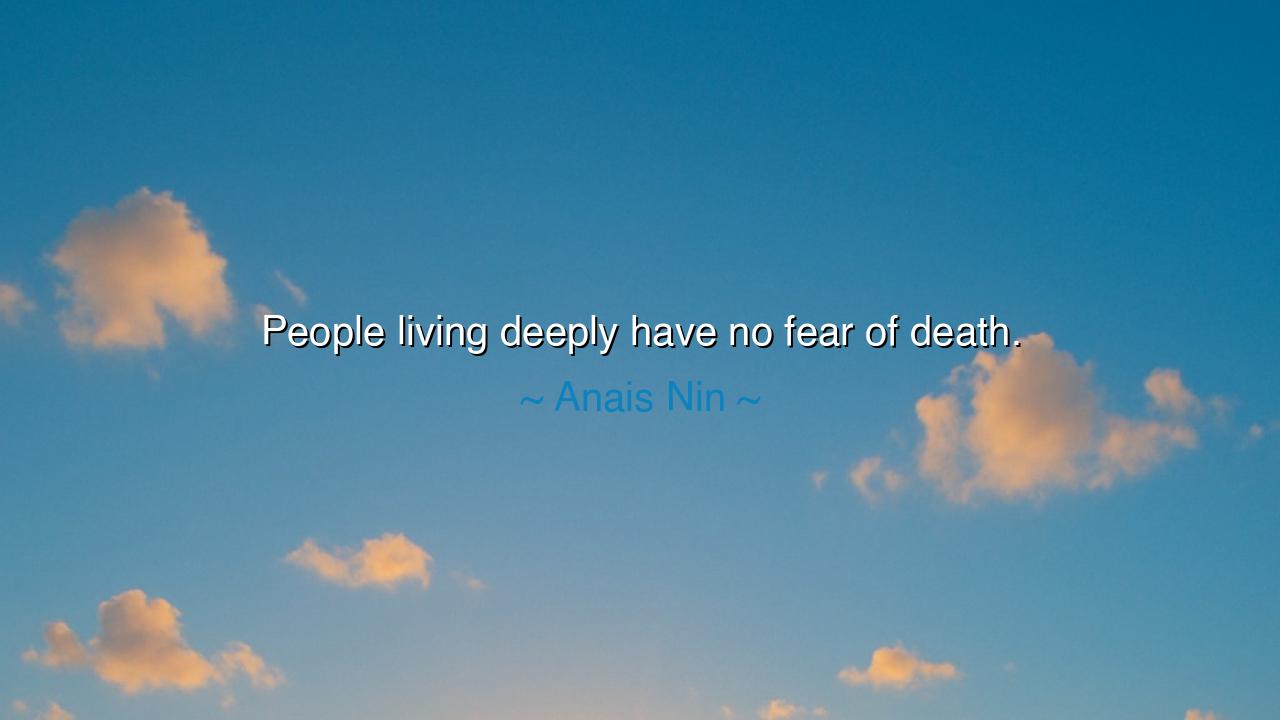
People living deeply have no fear of death.






“People living deeply have no fear of death.” — so wrote Anaïs Nin, the poet of the soul’s hidden tides, whose words still echo like quiet thunder through the chambers of human thought. In this brief but boundless reflection, she captures one of the oldest truths known to humankind: that life and death are not enemies, but companions — and that the one who lives deeply, who drinks fully from the well of experience, meets the end not with terror, but with peace. For fear of death arises not from the certainty of mortality, but from the poverty of living.
To live deeply is to live with awareness — to feel the pulse of existence in every breath, to see beauty even in pain, and to embrace each passing moment as a sacred fragment of eternity. Those who skim the surface of life, who fear to feel too much or to love too deeply, dread death because they have not yet tasted the fullness of being alive. They are like travelers who have reached the end of a journey only to realize they never truly looked at the road beneath their feet. But the one who has lived, truly lived — who has laughed, wept, risked, created, and forgiven — stands before death as before an old friend, ready for the next chapter of the story.
Anaïs Nin’s words were born from a life of intensity — a woman who lived through exile, war, art, and passion, who filled her journals with the fire of existence. She understood that fear of death is often the echo of a life unlived. To live deeply, she believed, is to awaken every faculty of the spirit: to love without restraint, to create without apology, to confront pain without fleeing. Death cannot rob the one who has already given everything to life. Such a person dies as the tree dies — not suddenly, but as a culmination, releasing its final breath as an offering to the wind.
The ancients knew this truth well. The Stoic philosopher Marcus Aurelius wrote, “It is not death that a man should fear, but he should fear never beginning to live.” For him, death was the natural conclusion of a virtuous and thoughtful existence, a part of the cosmic order. The Samurai, too, meditated daily on death, believing that only by accepting it completely could one live with perfect clarity and courage. Likewise, the Buddha taught that life gains meaning when one ceases to cling — that the end of fear comes not from denying death, but from embracing impermanence as the essence of all things. Nin’s insight flows from this same river of timeless wisdom.
Consider the story of Socrates, who, condemned to die, drank the hemlock calmly before his followers. When they wept, he rebuked them gently, saying that the true philosopher prepares for death his entire life — not in dread, but in understanding. He had lived deeply in the pursuit of truth and virtue, and thus he could face the end without trembling. His peace was not the absence of pain, but the presence of purpose. To him, as to Anaïs Nin, death was no punishment, but the final note in a symphony well played.
Those who live deeply are not those who seek pleasure alone, but those who live with depth of heart and purpose. They are the lovers, the artists, the thinkers, the servants of good — the ones who give themselves wholly to each moment. They risk heartbreak because they value connection more than safety; they risk failure because they value creation more than comfort. And because they have embraced the full spectrum of existence — joy, sorrow, triumph, loss — they are ready when the curtain falls. To live deeply is to weave meaning into one’s days, so that death finds no emptiness to fill.
So, my child, let this be the lesson: do not seek to avoid death — seek to avoid an unlived life. Fear loses its grip when the heart is full. Wake each morning as though your days were counted, and they will multiply in meaning. Love so greatly that your affection leaves an echo; create something, however small, that outlives you; speak truth, even when it trembles on your tongue. Then, when the final breath comes, you will not cling to what is leaving — you will smile, knowing you have already lived your eternity in the span of your years.
For as Anaïs Nin reminds us, those who live deeply have no fear of death, for they have already discovered the secret: that to live fully is to conquer mortality, and that the soul which burns brightly leaves no shadow behind.






AAdministratorAdministrator
Welcome, honored guests. Please leave a comment, we will respond soon